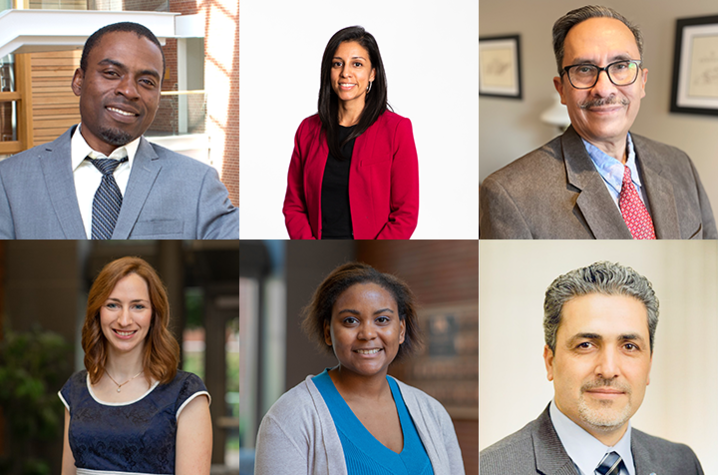Research Scholars Program for Inclusive Success Welcomes 2nd Cohort

LEXINGTON, Ky. (April 29, 2022) — The Research Scholars Program (RSP) aimed at ensuring diversity and inclusion in research by promoting faculty success welcomed its second cohort of six faculty from four University of Kentucky colleges.
RSP was created by the Office of the Vice President for Research in 2021, with support from the Office for Faculty Advancement, Center for Health Equity Transformation, and Center for Clinical and Translational Science. In 2022, RSP is also being supported by the colleges of Public Health, Medicine, Engineering, and Agriculture, Food and Environment.
RSP is aligned with national priorities for research diversity, including the National Institutes of Health (NIH) Faculty Institutional Recruitment for Sustainable Transformation (FIRST) program's goal of creating cultures of inclusive excellence at NIH-funded institutions by implementing well-integrated, evidence-based strategies and evaluating their impact on metrics of institutional culture, inclusive excellence and diversity.
RSP provides professional development programming, engages UK’s collaborative scientific community through multilevel mentorship and coaching to embed the cohort in inclusive research environments, and establishes a scientific and social networking structure for the cohort to reduce isolation and facilitate connections within the research community and the overarching institution. RSP was developed using survey, focus group and interview data, evidence-based programs, and input from a 15-member Faculty Advisory Committee.
“The Research Scholars Program was built on a foundation of extensive input from a diverse array of researchers' voices. During its inaugural year, we learned so much about how to optimize the program to meet the needs of our talented junior faculty. We’ve tweaked the program according to yearlong input and extensive follow-up interviews and surveys, expanding or reducing some components,” said Nancy Schoenberg, Ph.D., RSP co-director. “Cohort 2 is a phenomenally talented group which, like their predecessors, is determined to achieve research success and impact.”
The faculty cohort will engage in scientific networking and receive sponsorship through UK’s seven transdisciplinary Research Priority Areas (diversity & inclusion, substance use, cancer, diabetes & obesity, cardiovascular diseases, energy and neuroscience).
Kevin Pearson, Ph.D., RSP co-director said, “Mentorship from the six RSP peers, near-peers who recently received external grant funding, and more senior scientific mentors are all key components to the RSP and will help to build a network and contribute to the long-term research productivity of the participating junior faculty. Further, we have already had engagement and positive interactions between our Research Scholars from Cohorts 1 and 2 — we hope this program will foster long-lasting collaborations and friendships across research units on campus.”
“This is an intensive program that leverages stellar programming and committed faculty mentors from across the university to enhance the research careers of talented junior faculty members. Through the Research Scholars Program and other initiatives, the University of Kentucky is acknowledging that optimal research impact and innovative discovery depends on nurturing and encouraging the talents of all people,” Schoenberg said.
Cohort 2 Faculty
- Reuben Adatorwovor, College of Public Health, Dependence models for cancer survival analysis with competing risks for population-based studies
- Yasir Alsiraj, College of Medicine, Role of sex chromosomes on the incidence and outcomes of aortic aneurysms and atherosclerosis
- Juan Canedo, College of Medicine, Prevention and early detection of cancer to reduce racial and ethnic disparities, including high-risk strains of the human papillomavirus in the Hispanic population
- Fanny Chapelin, College of Engineering, Non-invasive MRI methods to track immune cell migration to inflammation sites in transplant rejection, autoimmune diseases and cancer
- Brittany Givens Rassoolkhani, College of Engineering, Polymeric drug delivery to treat advanced stage endometrial cancer and address health disparities in endometrial cancer mortality and targeted drug delivery systems
- Julie Plasencia, College of Agriculture, Food and Environment, Diet-related health disparities in Type 2 diabetes and Hispanic populations, and the influence of ethnic, cultural food beliefs and practices
Faculty Advisory Committee
- Chana Akins, Office of Faculty Advancement, College of Arts and Sciences
- Katie Cardarelli, Office of the Provost, College of Public Health
- Linda Dwoskin, College of Pharmacy
- Candice Hargons, College of Education
- Debra Harley, College of Education
- Kathy Grzech, Proposal Development Office
- Carrie Oser, College of Arts and Sciences
- Michael Rowland, College of Medicine
- Brittany Smalls, College of Medicine
- Greg Smith, College of Arts and Sciences
- Lisa Tannock, College of Medicine
- Donna Wilcock, College of Medicine
- Keith B. Wilson, College of Education
- Guigen Zhang, College of Engineering
- Stephanie White, College of Medicine
Learn more at the RSP site: www.research.uky.edu/rsp.
As the state’s flagship, land-grant institution, the University of Kentucky exists to advance the Commonwealth. We do that by preparing the next generation of leaders — placing students at the heart of everything we do — and transforming the lives of Kentuckians through education, research and creative work, service and health care. We pride ourselves on being a catalyst for breakthroughs and a force for healing, a place where ingenuity unfolds. It's all made possible by our people — visionaries, disruptors and pioneers — who make up 200 academic programs, a $476.5 million research and development enterprise and a world-class medical center, all on one campus.




